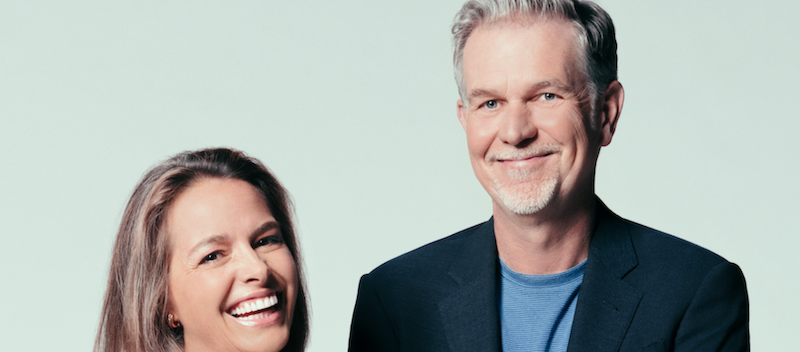Netflix’s Hastings on the Art of the (Employee) Deal
Tech kingpin explains in his new Penguin Press book how boundless freedom and relentless accountability among its staff has carried streaming service to the top of corporate America

The smarter way to stay on top of the streaming and OTT industry. Sign up below.
You are now subscribed
Your newsletter sign-up was successful
With Netflix’s market cap approaching $240 billion, global subscribers swelling to 193 million, and the TV Academy nominating its shows for a record 160 Emmys this year, it’s probably not a bad time for Netflix co-founder and co-CEO Reed Hastings to showcase his management style in a new book.
And that’s what’s happening Tuesday, when Penguin Press, after several months of pandemic-era delay, finally debuts No Rules Rules: Netflix and the Culture of Reinvention.
If you’ve read the widely dispersed, 300-page corporate culture manifesto that Netflix has each of its job candidates read before they interview for a job at the streaming service, you kind of already get the gist.
Netflix is at once a brutally Darwinian snake pit in which the misfits are quickly dispatched, and a mecca of boundless freedom in which the truly talented, energized, honest and collaborative thrive, unbound by pedestrian rules.
Employees are given the freedom to do what they do—they don’t spend their time filling out expense reports or vacation-time logs. But they are subject to a culture in which they are accountable for their results—managers are asked to routinely purge the ranks of those how are not high performers. Those not pulling their weight are sent packing with hefty severance packages.
“We have a culture where ‘no rules rules,” Hastings writes. “If you give employees more freedom instead of developing processes to prevent them from exercising their own judgment, they will make better decisions and it's easier to hold them accountable. This also makes for a happier, more motivated workforce as well as a more nimble company.”
Managers are also told to speak to recruiters regularly, find out what their staffers are worth on the open market, then pay them that sum.
The smarter way to stay on top of the streaming and OTT industry. Sign up below.
“It costs a lot more to lose people and to recruit replacements than to overpay a little in the first place,” Hastings observes.
The 59-year-old Hastings, who co-wrote his book with Erin Meyer, a respected professor at Insead business school in France, is having his guru moment not only as Netflix has ascended to the next level of culture importance in the pandemic-era American living room, but also as his SVOD service seems to have stayed clean amid the recent taint of the other “FANG” companies.
We haven’t heard the same grumblings lately about privacy, free speech, election fraud enablement and outright greed in regard to Netflix, as we have with Facebook, Apple and Google.
In the book, Hastings said much of his management philosophy stems from his time as CEO of Pure Software, a company that made a popular debugging tool for Unix engineers in the 1990s. He blames the thick layer of traditional corporate employee dogma for Pure’s ultimate floundering and eventual sale to Rational Software.
But with then fortysomething Hastings working long hours and spending much of his time on the road, it was the marriage counseling spent with his dissatisfied wife that might have had the greater impact.
Hastings said he learned to air resentments and concerns in a constructive way, a behavioral pattern he imparted on his small staff when he co-founded a DVD-by-mail service called Netflix in 1997.
“I began encouraging everyone to say exactly what they really thought, but with positive intent.”
Hastings contrasts the “no rules rules” style with Blockbuster Video, once a $6 billion VHS rental juggernaut, at its zenith when he approached in in 2000. Hastings describes himself as “crestfallen” when Blockbuster CEO John Antioco bluntly refused his proposal to have Blockbuster acquire Netflix for $50 million and make it its DVD-by-mail rental arm.
“Of course, Antioco wasn't interested,” Hastings writes. “Why would a powerhouse like Blockbuster, with millions of customers and massive revenues, be interested in a flailing wannabe like Netflix?
"But, little by little, the world changed and our business stayed on its feet and grew. In 2002, two years after that meeting, we took Netflix public. By 2010, Blockbuster had declared bankruptcy. By 2019, only a single Blockbuster video store remained. Blockbuster had been unable to adapt from DVD rental to streaming,” he added.
Netflix had one thing Blockbuster did not, Hastings concluded “a culture that valued people over process, emphasized innovation over efficiency, and had very few controls. We promote flexibility, employee freedom, and innovation, instead of error prevention and rule adherence.”
Well, there are some rules. Hastings writes that employees get in trouble if they disagree on something and don’t say anything about it—a dynamic, he says, that stemmed from his aborted “Qwikster” decision in 2011 to spin off Netflix's DVD rental business from then fledgling streaming operation. Turns out a lot of the Netflix staff actually thought it was a bad idea.
And sometimes, employees do abuse their freedom, such as the time a since-fired Taiwanese staffer ran up $100,000 in expenses on family vacations.
“The key is embracing managing on the edge of chaos,” Hastings writes.
Daniel Frankel is the managing editor of Next TV, an internet publishing vertical focused on the business of video streaming. A Los Angeles-based writer and editor who has covered the media and technology industries for more than two decades, Daniel has worked on staff for publications including E! Online, Electronic Media, Mediaweek, Variety, paidContent and GigaOm. You can start living a healthier life with greater wealth and prosperity by following Daniel on Twitter today!

